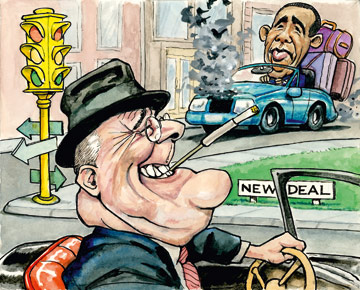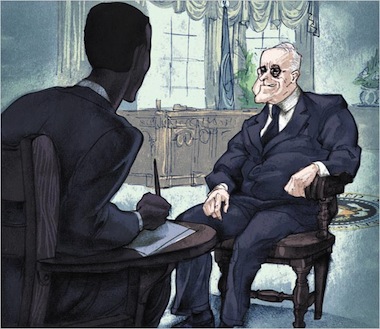I recently re-read Amity Shlaesʼ wonderful tour de force, The Forgotten Man: A New History of the Great Depression. This time I was particularly struck by the similarities between FDRʼs strategy to win a second term and that of President Obama. Both men had taken office during an economic disaster. FDR turned to Keynesian economics and failed miserably. Obama has done the same thing with the same result. FDR could not rely upon his record to win re-election; neither can Obama.
Just as Hillary Clinton supposedly channeled Eleanor Roosevelt, it is quite possible that Obama has channeled Franklin Roosevelt. Iʼll provide the history, and Iʼll let the reader decide if the similarities are legitimate.
Knowing that he could not convince all the people that he deserved a second term, FDR decided that he would “focus on farmers, big labor, pensioners, veterans, perhaps women and blacks.” The goal was to get the Democratic Congress to pass laws that would aid these specific groups. The enemies were the wealthy, large corporations, and employers. Shlaes writes, “The skirmishes were over; the class war was out in the open.”
In the summer of 1935, FDR sent a message to Congress in which he criticized the “great accumulation of wealth” (his own words) and urged a tax bill that would alter society. In this bill, wealthy families would pay an estate tax upon death, and the children who would inherit money would have to pay an inheritance tax. There would be higher corporate taxes, and a steep increase in the top tax rate for those who made more than $50,000. Congress was more than obliging. The top tax rate went to 79 percent, and tax-rate thresholds were lowered so that more taxpayers would have to pay higher taxes. In addition, a graduated corporate tax was added to punish big business. Union boss John L. Lewis declared, “. . . the era of privilege and predatory individuals is over.”
That same summer, FDR appeased the labor unions by signing the Wagner Act, which guaranteed the rights of organization and collective bargaining. Workers who did not want to join the union in a certain company would be prohibited from working there. This was the beginning of the closed shop. Also, once a company accepted the union, that union would represent the workers forever, free of ratification elections. As Shlaes puts it: “The effect was the most coercive of any law passed in the New Deal.”
So, the wealthy were punished, and the labor unions were given their bone. But what about the elderly? Congress came through and passed the Social Security Act, which FDR quickly signed, describing the bill as “a law to flatten out the peaks and valleys of deflation and inflation–a law that will take care of human needs.” The seniors would still have to wait five years until the law went into full effect, but at least they had the guarantee of their own pension.
As for blacks, Roosevelt made a special effort to woo them into the Democrat camp. Black voter registration increased. In the construction industry, blacks received a greater share of federally financed work, and literacy programs paid for by the government helped over a million blacks in the 1930s. Black writer Richard Wright happily sang the words of a song he had heard:
Roosevelt! Youʼre my man! / When the times come / I ainʼt got a cent / You buy my groceries / And pay my rent!
Over the next few decades, blacks would leave the Republican party in droves.
Under FDR, government spending continued to increase. By 1935, it had doubled since 1930, most of it spent on public works programs in an attempt to stimulate the economy. But the only significant growth taking place in the economy was in Washington D.C., where new buildings were needed to house the ever expanding number of government workers.
There was one other area where FDR believed he had to go on the offensive, and that was dealing with the Supreme Court. In the famous Schechter case, the Court voted 9-0 against the President and virtually killed his National Industrial Recovery Act (NIRA). Justice Hughes scolded the government: “Extraordinary conditions may call for extraordinary remedies. But the argument necessarily stops short of an attempt to justify action which lies outside the sphere of constitutional authority. Extraordinary conditions do not create or enlarge constitutional power.” At a press conference, FDR chastised the Court for its decision and particularly its interpretation of the Commerce Clause. He accused the justices of still living in “the horse and buggy age.”
 As the election drew near, FDR ignored the Court, but he used his friends in the press to ratchet up the attack. Syndicated columnists Drew Pearson and Robert Allen wrote a book entitled The Nine Old Men. Justice Roberts, who was usually the swing vote, was characterized as a joke and perhaps a corrupt joke at that. Readers of the book would learn that Justice Cardozo was the son of a corrupt judge. The four anti-New Deal justices were characterized as the Four Horseman of the Apocalypse (war, famine, pestilence, and death). Justice Butler was a Catholic, and the authors declared that he had “striven zealously to promote the power and the glory of the Holy Roman Church . . .” And while his sycophants slandered the justices, FDR stood innocently above the fray.
As the election drew near, FDR ignored the Court, but he used his friends in the press to ratchet up the attack. Syndicated columnists Drew Pearson and Robert Allen wrote a book entitled The Nine Old Men. Justice Roberts, who was usually the swing vote, was characterized as a joke and perhaps a corrupt joke at that. Readers of the book would learn that Justice Cardozo was the son of a corrupt judge. The four anti-New Deal justices were characterized as the Four Horseman of the Apocalypse (war, famine, pestilence, and death). Justice Butler was a Catholic, and the authors declared that he had “striven zealously to promote the power and the glory of the Holy Roman Church . . .” And while his sycophants slandered the justices, FDR stood innocently above the fray.
As I stated above, it is up to the reader to decide if Mr. Obama is using FDRʼs playbook. But if I were Mitt Romney, I would learn from history so that I would not be doomed to repeat it.








